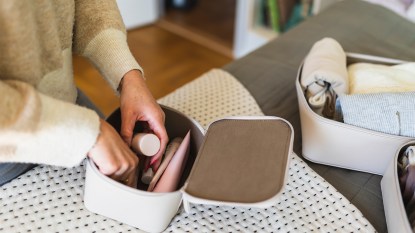Expert Advice: 3 Intimate Women’s Health Issues, Solved (From Periods to Menopause)
This week, our expert responded to three questions about perimenopause and menopause symptoms.

Whether you still have your period or you’ve entered menopause, your reproductive health can take a turn at any moment. The onset of sudden symptoms can be debilitating, especially if they’re difficult to manage and disrupt your day. To help with your most important questions, FIRST expert Dr. Barbara DePree is here with answers. This week, she responded to three separate questions from our readers on menopausal heart palpitations, skin tags on the labia, and gastrointestinal (GI) distress during periods.
Meet our expert.
Barbara DePree, MD, is a gynecologist in private practice and director of Women’s Midlife Services at Michigan’s Holland Hospital. A Certified Menopause Practitioner, she is the founder of MiddlesexMD.com, an educational resource for women’s sexual health in perimenopause and beyond. To ask her a question, send an email to health@firstforwomen.com.
Menopausal Heart Palpitations
Q: I’m 47, and I’ve been having heart palpitations along with my hot flashes. My doctor ruled out serious heart issues, but I’m still worried. Should I be?
A: Probably not. Heart palpitations, which can manifest as skipped beats, a racing heartbeat or flutters, may signal perimenopause. They’re a lesser-known symptom of menopause, but they’re common: Research published in the journal Menopause revealed that up to 47 percent of women experience this symptom.
The palpitations are triggered by declining estrogen: As levels of the hormone wane, so do its cardio-protective qualities, including its ability to keep blood vessels elastic and flexible and maintain proper circulation. These palpitations, which are sometimes accompanied by hot flashes or anxiety, usually resolve after menopause, when hormones stabilize.
To get immediate relief, I suggest trying a deep-breathing technique called box breathing, which is designed to combat stress and produce a relaxation response in as little as 30 seconds, easing palpitations by slowing the heart. To do: Breathe in slowly for a count of four, then hold your breath for another four counts. Exhale for another four and hold your breath again for four. Repeat the technique as often as needed when palpitations strike and before you go to bed to ward off nighttime palpitations.
Also helpful: avoiding stimulants such as caffeine, nicotine and pseudoephedrine, which is found in many over-the-counter and prescription cold medicines commonly used this time of year. You also may want to consider supplementing with 500 milligrams of magnesium citrate daily. Studies show deficiencies in the mineral are tied to abnormal heart rhythms, including palpitations.
Skin Tags on the Labia
Q: I felt something snag on my underwear the other day, and a hand mirror revealed what look like two small skin tags on my labia. They don’t hurt or itch. Should I be concerned or can I leave them be?
A: It does sound like you’re describing benign skin growths (acrochordons), commonly referred to as skin tags. They appear in areas where the skin folds — under arms, on the neck, eyelids and even outside the vagina — and up to 50 percent of women have at least one. Although we doctors aren’t sure what causes them, they’ve been linked to diabetes, insulin resistance, obesity, and hormone flux. But they’re harmless and sometimes even fall off on their own.
That’s why, if yours aren’t bothering you, I suggest leaving them be. Simply monitor them for any growth or other changes, like pain or bleeding, and point them out to your doctor at your next annual visit. If they do become bothersome, she can quickly remove them in-office.
GI Distress During Your Period
Q: Lately, I’m constantly running to the bathroom with diarrhea when my period begins. How can I make this stop?
A: You’re not alone! A study revealed that up to 73 percent of perimenopausal women experience at least one GI symptom before or during their period, and abdominal pain and diarrhea topped the list. Why? The hormone-like chemicals called prostaglandins produced during menstruation that cause the uterus to expel its lining can also cause cramps, abdominal pain and diarrhea.
To minimize these effects, take 600 millilgrams of ibuprofen, a prostaglandin inhibitor, twice daily before your period arrives. Free period tracking apps, such as Flo and Clue, can help you pinpoint when your cycle is due, which can be more unpredictable in perimenopause. Also smart: eating fiber-rich foods like bananas, oranges, and sweet potatoes to help firm up your stools.
A version of this article originally appeared in our print magazine, First for Women.













